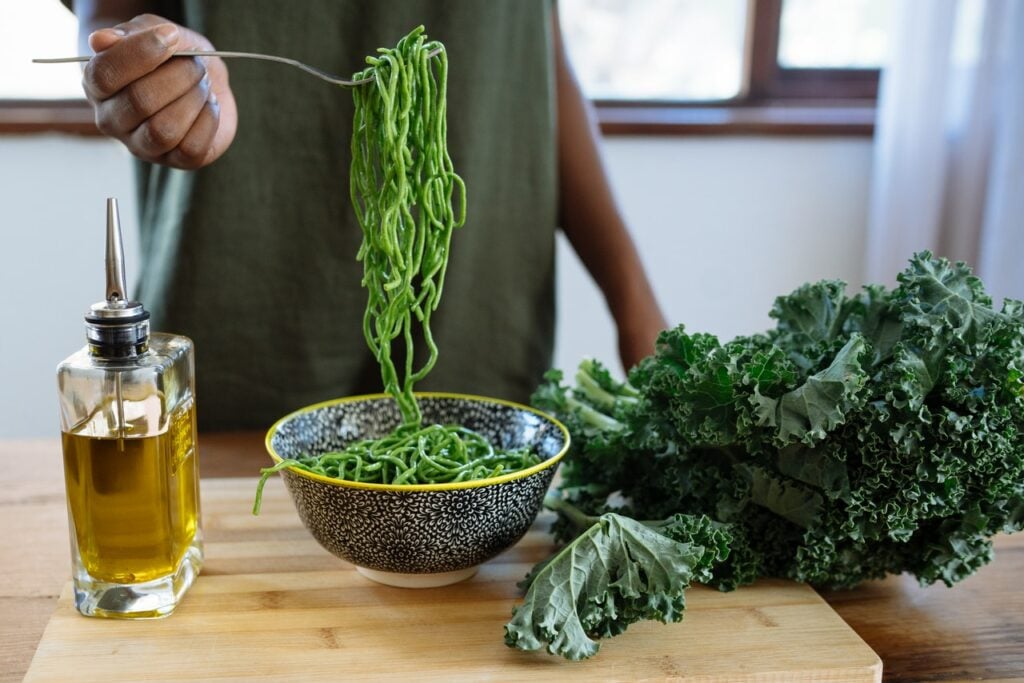Olive Oil Versus Extra Virgin Olive Oil: What’s the Difference?

Want to cook like a chef at home? Then you need to know your olive oils!
Olive oil is one of the most universal cooking oils. If you’ve ever shopped for it and felt overwhelmed by the options, you may be wondering:
- What is olive oil?
- What is extra virgin olive oil?
- And what is the difference?
In this guide, we’ll walk you through the debate of extra virgin olive oil vs olive oil—and when to use both. Let’s explore the difference between extra virgin and olive oil!
What Is Olive Oil?
So what is olive oil? Olive oil is a type of vegetable oil that is made from olives (the fruit of the tree Olea europaea L.). It is extracted by crushing or pressing the olives, which releases their natural oils.
You can use olive oil in cooking, baking, and as a dressing on salads or other foods. There are many different types of olive oils. Oils are graded based on how they were extracted and what kind of olives were used to make them.
Even fifty years ago, olive oil was still fairly foreign to Americans. It became popular thanks to Italian immigrants who helped spread the Mediterranean cuisine.
Often what is simply labeled “olive oil” in stores is actually a grade referred to as refined olive oil. This is virgin olive oil that has been further processed, with some more pure virgin added for taste.
Pros of Cooking with Olive Oil
Cooking with olive oil offers many benefits, not only to the flavor of food but also to your health. Here’s why it stands out in the kitchen:
- It’s heart-healthy. Olive oil is rich in monounsaturated fats. These can help reduce bad cholesterol levels and lower the risk of heart disease.
- Rich in antioxidants. These compounds fight inflammation and can protect your cells from damage.
- Versatile in the kitchen. Whether you’re sautéing, frying, or dressing salads, olive oil is a go-to. It adds a delicate, yet distinct flavor.
- High smoking point. Refined olive oil’s higher smoking point makes it suitable for multiple cooking methods. (Ex. Frying or baking)
- Promotes healthy digestion. Olive oil can also aid in digestion by stimulating the digestive system.
Cons of Cooking with Olive Oil
Despite its many benefits, cooking with olive oil does have a few drawbacks. Here’s what to keep in mind:
- Can be pricier. High-quality olive oils can be more expensive than other cooking oils. (Extra virgin olive oil is one example!)
- Not ideal for all cooking methods. While refined olive oil has a high smoke point, extra virgin olive oil does not. This makes it less suitable for high-heat cooking like deep-frying.
- Strong flavor. Some people find that the distinct flavor of olive oil can overpower milder dishes.
- Oxidation. When exposed to light and heat, olive oil can oxidize. This means it loses some of its beneficial properties. It could also potentially create harmful compounds.
- Shelf life. Olive oil does not last as long as some other oils. It’s best used within a few months of opening for optimal flavor and health benefits.
What Is Extra Virgin Olive Oil (EVOO)?
Even experienced home chefs may be wondering, “What is extra virgin olive oil?” Luckily it’s not as complicated as it may sound!
Extra virgin olive oil is a grade of “virgin” olive oil. Virgin, in the context of olive oils, means that the oils have been extracted only by mechanical means. This may be by the traditional pressing method or with more modern centrifugation.
Heat is never used on virgin olive oils. “Extra virgin” olive oil meets high standards for production and quality. These are determined by the International Olive Council (IOC).
Extra virgin olive oil is the highest quality and most flavorful olive oil you can buy. It is achieved by pressing olives with a stone mill. This is similar to how the ancient Mediterraneans would have done it.
Pros of Cooking with Extra Virgin Olive Oil
Cooking with extra virgin olive oil (EVOO) brings its own set of advantages. These benefits enhance both the taste and healthfulness of your meals:
- Maximum flavor. EVOO is celebrated for its robust taste and aroma, which can elevate the flavor profile of any dish.
- Rich in polyphenols. These natural compounds are known for their antioxidant properties. They promote heart health and may help reduce the risk of chronic diseases.
- Enhances food’s nutritional value. Using EVOO in salads can increase the absorption of fat-soluble vitamins from vegetables.
- Low in processed fats. It’s made without chemicals or industrial refining. It’s a cleaner, more natural choice.
- Supports weight management. The healthy fats in EVOO can help balance blood sugar levels. This will help you reduce cravings and promoting a healthier body weight.
Cons of Cooking with Extra Virgin Olive Oil
Despite the quality and health benefits of extra virgin olive oil, there are a few drawbacks. Keep these in mind:
- Higher cost. Quality comes at a price, and EVOO is no exception. Its premium status means it’s often more expensive than other oils.
- Lower smoke point. EVOO is not ideal for high-heat cooking methods such as frying or grilling. It has a lower smoke point compared to refined oils.
- Distinctive taste. Its rich flavor is a culinary asset but can sometimes overshadow the taste of lighter dishes.
- Sensitive to light and heat. EVOO can deteriorate quickly if not stored properly. This affects its taste and health benefits.
- Limited shelf life. Want to enjoy the best quality? It’s recommended to use EVOO within a year of bottling and within a few months once opened.
What Does Extra Virgin Mean In Olive Oil?
The term “extra virgin” in the context of olive oil is more than just a label of quality. It signifies purity and excellence.
Extra virgin olive oil is made from the first cold pressing of olives. This ensures that the oil is extracted without the use of heat or chemicals.
This process preserves the natural flavors, nutrients, and aromas of the olives. It results in an oil that is not only superior in taste but also in health benefits.
As a reminder: the “extra” in extra virgin means this oil meets the strictest criteria for:
- Acidity
- Taste
- Aroma
In other words, it’s the purest form of olive oil available on the market.
Olive Oil Versus Extra Virgin Olive Oil
The IOC plays a major role in the debate of extra virgin olive oil vs olive oil. The organization assigns grades to olive oils based on the percent of fatty acid and nutrient content present. EVOO should contain no more than 0.8% free acidity, versus up to 2% in virgin olive oil.
What’s the Difference Between Olive Oil and Extra Virgin Olive Oil?
Process is the key differentiator between olive oil versus extra virgin olive oil. Extra virgin olive oil is only made from the purest processes.
For standard olive oils, you heat the fruit pulp to high temperatures. This helps separate the fruit from its juices.
EVOO must be free from defects like abnormal acidity, bitterness, or pungency. In contrast, cheaper olive oils use a refining process that strips the oil of its nutrients. So, using EVOO is healthier, and using a cheaper olive oil will be less nutritious.
Fast facts about extra virgin olive oil:
- It has a lower smoke point than regular olive oil.
- It has the lowest acidity level of all olive oils.
- It contains the most anti-oxidants of all olive oils.
- It has a lower percentage of oleic acid (monounsaturated fat).
If trying to identify olive oil versus extra olive oil in the wild, the color may provide a hint.
Extra virgin olive oil tends to be darker and more green because it is a more pure extraction of the olive. Meanwhile, standard olive oil is usually a light pale yellow.
Compared to standard olive oil, extra virgin olive oil can be quite expensive. It’s so labor-intensive to produce. Hundreds of handpicked olives have to be pressed every hour. But when it comes to using high-quality ingredients, you truly do get what you pay for.
If you see something marked as “light” olive oil, don’t be fooled. These oils are not lower in calories or fat. The “light” label refers to a lighter flavor and taste, usually because it has been refined.
Now, you know the key difference between extra virgin and olive oil. Let’s dive into when to use both.
When to Use Olive Oil
One common question is when to use olive oil versus extra virgin olive oil in cooking.
Want to choose the best oil for your dish? You should consider what type of cooking method you’ll be using and you’ll be relying on the flavor of the oil.
If you are thinking about frying or searing proteins, olive oil is a great option. Because of its higher smoke point, olive oil can be used for cooking at higher temperatures. (Still, it can’t go as high as butter or margarine).
Extra virgin varieties won’t hold up well under high temperatures. For any cooking higher than 350-415 degrees Farenheight, you’ll want to use standard olive oil.
When to Use Extra Olive Oil
Regular olive oils tend to be bland in taste. So, if you’re relying on the flavor of the oil itself, you’ll want to use extra virgin olive oil. If you’re going to be using your olive oil for salads or as a dip, then it’s best to go with an EVOO.
The flavor and aroma of extra virgin olive oil come from its delicate chemical structure. This structure breaks down when heated too high (burning). It’s best to avoid wasting your expensive EVOO on high-heat cooking.
While both have health benefits when they’re used in moderation (like lowering blood pressure), EVOO has more antioxidants than regular olive oil. It’s also got more monounsaturated fatty acids than its cheaper counterpart. Those who are looking for better heart health should opt for extra virgin over regular.
Olive Oil vs EVOO FAQ
Exploring the world of olive oils reveals a fascinating blend of tradition, taste, and health benefits. Here are some questions we often get about olive oil (and their answers!)
Which is better: extra virgin olive oil or olive oil?
We’ve talked about the difference between extra virgin and olive oil… but still wondering which is better?
If you’re comparing extra virgin olive oil vs olive oil, know this:
The choice boils down to intended use in cooking and personal taste preferences. Each type of oil serves its unique purpose. They each complement different dishes and cooking methods.
Extra virgin olive oil is perfect for dressings, dips, and drizzling over dishes. Regular olive oil is suitable for cooking at higher temperatures.
Both oils offer health benefits and can be incorporated into a balanced diet. The decision truly is a matter of culinary need rather than superiority.
Is extra virgin olive oil good for cooking?
Remember, extra virgin olive oil has a lower smoke point compared to regular olive oil. It’s often debated for its cooking applicability.
While it’s not the go-to for high heat cooking, it excels in low to medium heat applications. Perfect for simmering and baking, EVOO enriches dishes with its vibrant flavor. Most importantly, it maintains its nutritional essence.
Short and sweet, it’s not just good for cooking. It’s great for any kitchen endeavor that calls for a touch of excellence and a dash of healthful living.
Which olive oil is the healthiest?
This is easy: extra virgin olive oil.
EVOO is acclaimed for its high levels of antioxidants. These are pivotal in combating oxidative stress and promoting overall health.
Its abundant monounsaturated fats are key in supporting heart health. It’s an exceptional choice for those prioritizing a nutritious diet.
Olive oil is a common cooking substitution for health-conscious folks. All olive oils offer a healthier alternative to saturated and trans fats. But EVOO’s unrefined quality ensures that its beneficial nutrients remain intact. Its purity and nutrient-dense profile make EVOO the healthiest option on the shelf.
Is it OK to substitute olive oil for extra virgin olive oil?
Yes and no. It all depends on the cooking context.
Does your recipe call for a mild, versatile oil that can withstand high heat? Then olive oil is your go-to. For cold dishes, dressings, or when the unique flavor of EVOO is desired, sticking with extra virgin is the way to go.
Both oils bring their own merits to the table. The choice is more about the desired outcome of your culinary creation itself.
Feel free to make healthy food swaps based on your needs. Just remember each oil’s distinctive qualities to get the most out of your dishes.
Is frying with extra virgin olive oil healthy?
This is widely debated among culinary enthusiasts and health experts.
EVOO has health benefits, but frying with it compromises its nutritional value. That said, EVOO can be used for light frying at temperatures that stay under its smoke point.
The key is moderation and keeping the heat in the low to medium range. This method preserves its antioxidants and monounsaturated fats. EVOO can be a healthier option for frying compared to oils high in saturated fats.
It’s the cooking technique and temperature that determine the healthfulness of EVOO. It’s not just the oil itself.
Make Cooking Easy with Gobble!
Now, you know a little more about the pros and cons of extra virgin olive oil vs olive oil.
But if you’re still wondering:
- What is olive oil?
- What is refined olive oil?
- What is extra virgin olive oil?
If you’re tired of trying to figure out complicated cooking logistics, Gobble has you covered with affordable meal delivery. Get chef-crafted plans delivered straight to your door.
Each kit comes with pre-measured and hand-selected ingredients. You don’t need to worry about choosing the right oil for your recipe anymore!
If you’re looking to eat healthily, our Lean & Clean Plan offers heart-friendly meals for any diet. We have vegan, vegetarian, and gluten-free options!



